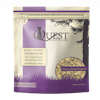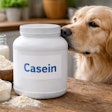
A newly published peer-reviewed study in Animals has found that a postbiotic ingredient, Superculture Pet Oral, significantly reduces oral malodor in dogs — offering a novel approach to pet oral health with potential applications in pet food and supplement formulations.
The double-blind, placebo-controlled clinical trial demonstrated that dogs receiving the ingredient showed a 27% reduction in volatile sulfur compounds (VSCs) — the microbial byproducts responsible for bad breath — compared to placebo. The postbiotic also showed a 22% reduction from baseline by Day 7 of administration, with no adverse events reported.
According to the study, twice as many dogs in the test group had noticeably improved breath after one week, as measured through a 10-point human odor scale. These improvements occurred without mechanical action, as the postbiotic was administered in powder form as a food topper.
The study underscores that while most oral care products for dogs rely on mechanical action (e.g., dental chews or brushing), clinically validated ingredients that target the microbial drivers of halitosis are still limited.
Superculture Pet Oral, the study said, may fill a critical gap. Unlike probiotics, which can be unstable during manufacturing or digestion, postbiotics offer a more robust and shelf-stable alternative that still modulates the oral microbiome.
Formulation flexibility for pet food and supplement developers
The ingredient’s stability and format compatibility allow it to be incorporated into a variety of product types, including powder toppers, chews and dry or wet pet food, the study noted. These characteristics could enable formulators to deliver oral health benefits without depending on abrasive texture or friction.
Up to 80% of dogs over the age of three are estimated to suffer from dental disease, which often presents as halitosis, the study emphasized. Targeting the bacteria that produce VSCs offers a functional path to not only improve breath but also support overall oral health and reduce inflammation risk.
The full study, titled A Novel Postbiotic Significantly Reduces Volatile Sulfur Compounds Associated with Canine Halitosis: A Randomized Controlled Trial, is available in the open-access journal Animals.
The study was conducted at a registered research facility in compliance with all applicable animal welfare regulations. The protocol was approved by the facility’s Institutional Animal Care and Use Committee (IACUC). Test subjects included beagles and small mixed-breed dogs aged 1 to 7 years, of both sexes and reproductive statuses.


















